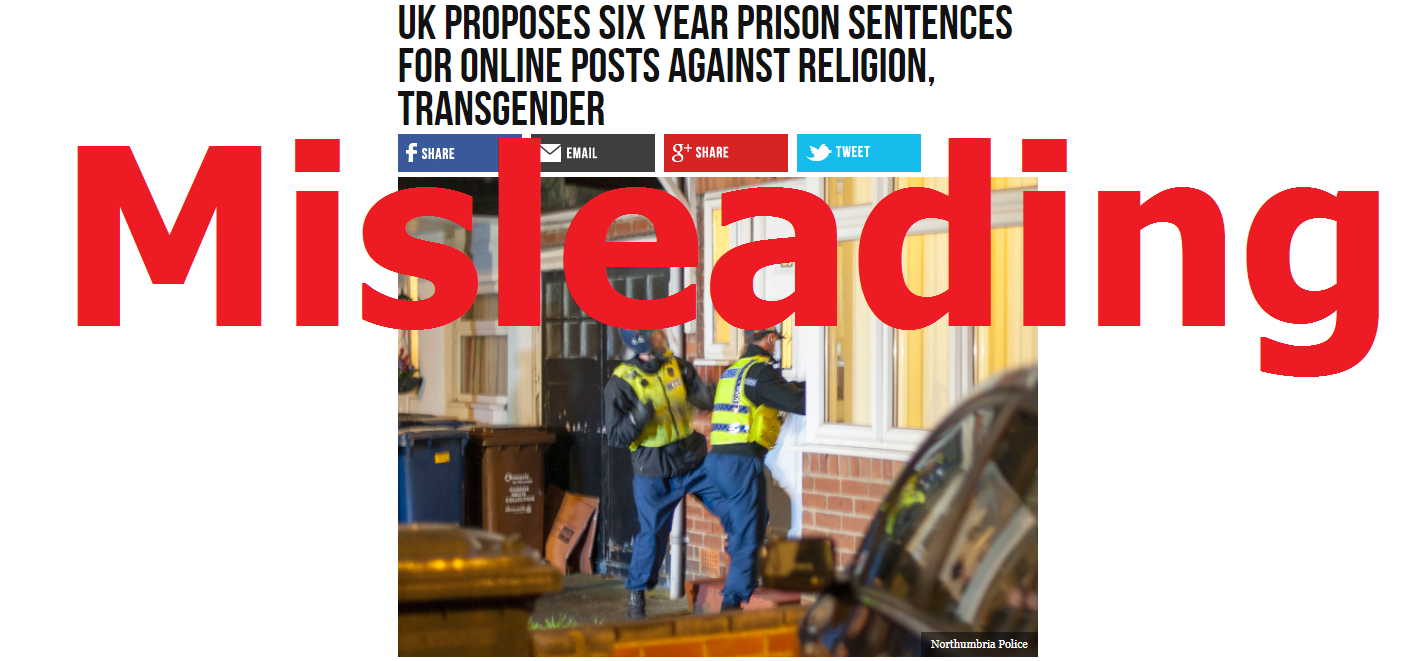
No, the United Kingdom is not planning to jail individuals who criticize Islam online
- This article is more than seven years old.
- Published on June 26, 2018 at 19:15
- Updated on June 29, 2018 at 14:42
- 2 min read
- By Jean-Gabriel FERNANDEZ, Louis BAUDOIN-LAARMAN
“UK proposes six-year prison sentence for criticizing Islam,” which is "more of Britain’s gallop toward Sharia and ruin" according to an article by the anti-islamic website Jihadwatch, shared over 10,000 times on social networks. The story cited another from far right website Breitbart.
Stirring up hatred against people on religious grounds exists as an offence in the UK since it was added to the Public Order Act in 2006. The Act makes a person using “threatening words and behaviours […] guilty of an offence if he intends thereby to stir up religious hatred”, provided there are outside witnesses. It is already illegal to publicly distribute messages encouraging hatred towards a community due to its ethnicity, faith, gender or sexual orientation.
However, much public speech is protected by the very same Public Order Act clause. That states that freedom of expression protects all types of “discussion, criticism or expressions of antipathy, dislike, ridicule, insult or abuse” towards a religion or the practices of its followers.
In order to be sentenced for stirring up hatred, a person with a large audience must distribute hateful content in a massive and persistent manner, to the point where a judge deems there to be “strong likelihood that many would be influenced” or that the life of at least one person was put in danger.
Among the types of speech liable to be prosecuted, a British government working document lists the “publication on YouTube of content inciting serious violence towards particular racial or religious groups,” when this type of action is “continuing over a long period of time and intended to reach global audiences.”
Misinformation based on a Ministry of Justice document
The misleading article refers to a document published by the Sentencing Council, which reports to the Ministry of Justice and creates guidelines on judicial sentencing. The document is a public consultation, due to last until August 8, aiming to encourage citizens to take part in creating new guidelines.
The Sentencing Council does not have the authority to pass or amend bills. It only provides judges with a course of action for sentencing.
“These proposals do not reflect a change in the law,” the Sentencing Council told AFP. “The proposed guidelines are not intended to increase sentences, but intend to provide greater transparency and consistency of the approach to sentencing for these existing offences.”
Should a person be sentenced for stirring up hatred towards a religious group, the Sentencing Council suggests a sentence from 26 weeks up to 6 years. For lesser offences, such as sharing content inciting hatred in a “reckless” manner, the Council suggests a sentence that does not include prison, such as community service.
“Volumes of these offences [leading to a legal proceeding] are extremely low and there have been no offenders sentenced for some offences,” the Sentencing Council added.
Between 2006 and 2016, 65 people were found guilty of stirring up hatred towards an ethnic, sexual, or religious group. The amount of people sentenced for stirring up hatred towards Islam in particular is unknown, as is the number of people sentenced to jail specifically.
Copyright © AFP 2017-2026. Any commercial use of this content requires a subscription. Click here to find out more.
Is there content that you would like AFP to fact-check? Get in touch.
Contact us
